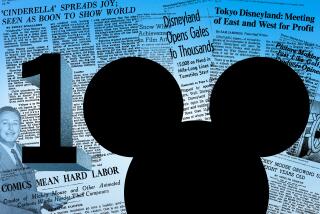Back to Basics at WOW
The toy company that brought America Teddy Ruxpin, an electronic bear that talks and sings, has changed its tune. Among the new toys from Worlds of Wonder are a $10 jump rope, $3 plastic “germs” and a $30 bat and ball set. There’s also a new $30 Teddy Ruxpin that doesn’t talk but lights up when its tummy is squeezed.
“We’re trying to balance our product line better,” Chairman Donald D. Kingsborough explained recently. The company has a big incentive to try something new: It filed for bankruptcy protection from its creditors last December. Now that demand for its pricey, high-tech toys has collapsed, low-price, low-tech toys are being called to the rescue.
A Gift That Puckers
Some banks give away toasters. Others give Walkman radios. But customers who walked into Southern California branches of Downey Savings & Loan last week walked out with Texas Ruby Red grapefruit.
Why grapefruit? It seems that Maurice L. McAlister, president of the S&L;, ate a grapefruit a few weeks ago and liked it so much that he decided to order a bunch for the thrift’s customers. So the S&L; spent $9,400 to buy 33,000 grapefruit--all of which were handed out in two days. “It was just a way to say thanks to our customers,” said John Dennis, the bank’s marketing director. “If it had been fall, I suppose we’d have given away apples.”
No Defections in L.A.
First Boston’s giant investment banking operations in New York were rocked recently by the defections of superstar merger and acquisition specialists Bruce Wasserstein and Joseph Perella. Wasserstein and Perella, who had built First Boston’s M&A; business virtually from scratch, took several other key colleagues with them and formed a new merchant banking firm, Wasserstein, Perella & Co.
But First Boston’s fast-growing Los Angeles investment banking operations have remained intact. No one is leaving to join the new firm, said Edward N. Robinson, co-head of First Boston’s investment banking activities in Los Angeles.
In fact, Robinson said, First Boston’s investment banking activities in Los Angeles will continue to grow, although not at the pace of the past year, when the number of bankers rose to about 17 from about 10 in the prior year.
The Verdict on Firing
Call him a Pollyanna, but San Francisco management lawyer Victor Schachter finds good news for employers in his firm’s survey of California court verdicts last year in cases where workers charged they were unfairly fired.
The average amount awarded to workers was $482,697, up 13%. (Not included is a huge $17.4-million award to one salesman fired for refusing to submit false reports to the government.) Aggrieved workers won more than six in 10 cases that went to trial.
But the workers’ winning percentage was down from 78% in 1986. And that makes Schachter think that jurors, while still basically more sympathetic to employees than bosses, may be changing their views somewhat. “I do believe we’re seeing at least a leveling off,” he said. “But employers still have an uphill battle, and they always will have an uphill battle.”
On the Trail of Copycats
The fine print at the end of the California Technology Stock Letter contains a fairly typical warning that unauthorized photocopying is prohibited by law. But newsletter publisher CTSL Publishing Partners of San Francisco has added to the small print. It now offers a reward for “conclusive evidence of illegal copying.”
The firm has yet to issue its first $500 reward, according to newsletter spokesman Michael Murphy. But he believes that other newsletter publishers may copy the idea.
More to Read
Inside the business of entertainment
The Wide Shot brings you news, analysis and insights on everything from streaming wars to production — and what it all means for the future.
You may occasionally receive promotional content from the Los Angeles Times.










